Chris Baty's Blog, page 187
June 23, 2014
Stories of Tomorrow: Running 5K... and Writing a Million Words

Tomorrow’s stories start in all sorts of places: on the drive to work, or at the movie theater. One constant source of inspiration? The classrooms that tackle NaNoWriMo through our Young Writers Program. Today, YWP educator Meghann Donohue talks about becoming a writer athlete, and why you should support tomorrow’s writers:
I have always known, in my heart, that I am a writer. I may not be the most disciplined, or most productive, and I am certainly not a novelist—yet—but I have always been good with words.
You know what I haven’t been good at? Anything super-athletic. I don’t have an athletic body, and I don’t particularly enjoy sweating. I am not one of those people that can’t live a day without exercise. However, in an effort to get in shape, and because so many people seem to love it, I started running last spring. Using phone apps and motivating music, I made myself get out on the trail 2-3 times a week. With the encouragement of my family, I signed up for my first 5K, and suddenly, I had a purpose. I was accountable. My pride was on the line.
The day of my first 5K, I alternated from feeling sick to my stomach, to a sense of disbelief that I was really going to do this. I got out there and ran the entire thing—every step—and there is very little that has made me prouder.
'So,' you may be thinking 'What does any of this have to do with writing?'
For lots and lots of my students, they have the reverse issue. They are young, and fit, and love to get outside and work their bodies. What they don’t like to do is sit at a desk silently and write. Words on paper seem foreign to them, especially if you don’t give them a predetermined topic. They struggle with their stamina and often consider themselves “done” when they reach the end of the page. Furthermore, they have no purpose. They have no goal they want to accomplish, except to make the teacher happy.
I needed to find them their own writing 5K. I had adult friends who had participated in NaNoWriMo, but had no idea the Young Writers Program existed until another teacher told me about it. In September, I talked my whole teaching team into making every student participate, and in November, we registered over 300 13- and 14-year-old students. We provided them with guidance on how to pick a topic, checked out laptops for them every day, played mood music, showed them model writing, and hung the charts and gave them stickers and pins. We talked about it constantly. It was our November.
And do you know what happened? They became writing athletes. They whispered about it in the halls like it was the big Saturday night game. They fought hard to get those stickers. They drilled themselves with their writing, doing word sprints and logging hours at home. Some of them even downloaded apps on their phone so they could “type” while on the bus. They wore their pins as if they were medals and high-fived each other when they reached the crucial moment of achieving their goal.
They ran every step of their writing 5k, and I could not be more proud.
In the end, the entire 8th grade class of 350 students wrote one million words. One million. More importantly, they found a purpose to their writing, a sense of achievement and community that they had never felt before. During end-of-year evaluations, it comes up over and over again that NaNoWriMo was the greatest writing experience they have had to date.
I may not be totally hooked on running, but I am hooked on NaNoWriMo YWP. I am so hopeful that having completed their first writing 5k, my students will come back again and again to do more. If that is the case, I would love for them to use a web site that is even more enhanced, engaging, and powerful. So go ahead and donate to support the Young Writers Program today. Consider it a donation to a charity race… because, for us, it is.

Meghann Donohue is a Nationally Board Certified teacher who teaches 8th grade English. Aside from teaching and being an English department chair, she is working on her first YA fantasy novel and raising her two young kids. She still occasionally finds time to go running.
June 20, 2014
To a Future Writer: I Hope You Are a Novel-Writing Cyborg
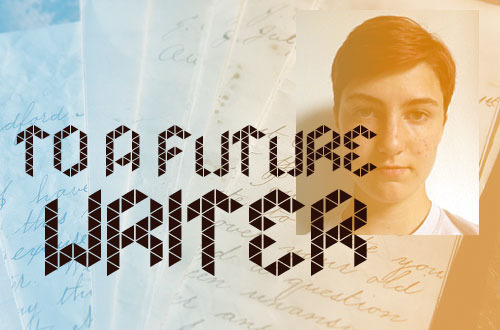
We asked participants in our Young Writers Program to write a letter to their future selves about their hopes, dreams, and reminders of what they love about creating on the page. If you want to support the future of tomorrow’s stories,check out our YWP campaign here. Today, Harper wonders if ze is a writing cyborg in the future:
Dear Future Harper,
You, my friend are a chronic procrastinator. Or at least you used to be, are you still one now? Come to think of it, are you part machine now too? The future might hold lots of interesting developments. Only time will tell. Of course it would be lovely if you weren’t a procrastinator anymore because procrastination is one of your greatest faults.
Example: remember that time you were asked to write a post for the NaNoWriMo blog and you had almost a month to do it and you waited to write it until 1 AM the morning it was due, typing frantically and playing Nirvana really loud to keep yourself awake? Yeah… *cough* Where was I?
Ah yes. Although your chronic procrastination makes it very difficult to get anything done, it is also the reason you made the best decision of your life and joined NaNoWriMo. You were 11 and had spent your whole life up until that point making up stories in your head but you had never actually put more than a few pages down on paper. You really wanted to be a writer but you procrastinated too much and you were short on motivation. And then you heard about NaNo and thought it sounded really cool and that maybe, just maybe, you could do it… you could accomplish the ridiculous task of writing a novel in a month.
And that month, you did, finishing with a rambling, pointlessly tragic 30,000 word novella about an Italian woman during WWI. (You were an odd child.)
That month, you also started to make friends, something else you were in short supply of at the time, and you continued to make friends on NaNo for years after. NaNo is, in fact where you met all your best friends (and also where you, by some miracle, learned to be slightly less awkward! But let’s be honest, you’re going to be awkward on some level for the rest of your life. It’s just who you are. Don’t deny it, Cyborg Harper). You went on to meet some of these friends offline (including Topaz whose letter is a little way down) which was so many shades of awesome.
I don’t know where you are now, but I hope very much that you’re still writing and still close to all the super cool people you met on NaNo. NaNo is the best thing that’s ever happened to you, and I hope you never forget it.
Love,
Past Harper

Harper is a 14-year-old non-binary nerd. Originally from Colorado, ze no longer has a permanent residence and is traveling all over the world with zir family until ze turns 18 (seriously!). Ze enjoys knitting, playing guitar, listening to old music, rambling about old music, blogging about old music, (ze really likes old music, can you tell?). You may know zem as therainbowlizard on YWP or TheRainbowTurtle on the adult site. (Ze like queerness and reptiles.)
June 18, 2014
Stories of Tomorrow: How to Open Doors to Imagination in the Classroom
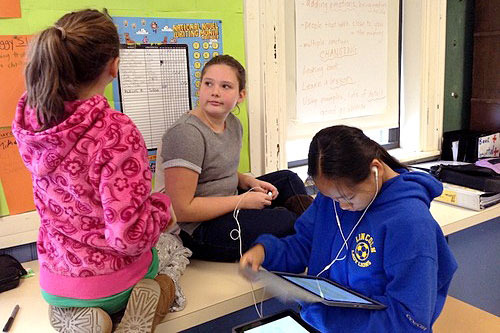
Tomorrow’s stories start in all sorts of places: on the drive to work, or at the movie theater. One constant source of inspiration? The classrooms that tackle NaNoWriMo through our Young Writers Program. YWP educator Alexis Lyon talks about incorporating YWP into her class curriculum.
I first saw NaNoWriMo’s Young Writers Program from a student teacher at Lincoln Middle School. My mentor also had the YWP progress chart hanging in the classroom for students who were participating in it outside of the classroom. The next year, as I was developing the curriculum for my own classroom, I decided to incorporate the Young Writers Program into my own lessons.
The program was such a success for my 6th grade class. I teach students in a two year loop, so I knew without a doubt that I would run the program with the same students in 7th grade. I had students asking me if we were going to do it again. They wrote so much and were so excited the first year, so I had a lot of momentum and new ideas for how to incorporate it into my curriculum again.
I think the hardest part of running the Young Writers Program is incorporating it into my curriculum plan for the year, though. With that said, I work with an amazing team of teachers who are willing to collaborate across curriculum, and I was able to combine my classes with the social studies teacher next door to have an all day Write-a-thon.
Other obstacles I ran into were related to technology. Students loved to see their word count in real time, and to keep going back to the site to update their progress or use the fun tools. I didn’t always have enough working laptops for the class, and sometimes it was hard to access the site either because of our school Wi-Fi, or the extreme volume of students logging into the NaNoWrimo site all over the world at once. We always had paper notebooks as backup though, and some students wrote on paper the whole month by choice.
I asked a student (Matthew Davis, now grade 7) if he thought there were obstacles. He thought, “Not really. When I was thinking about a topic, it came to me. It was like opening a door to imagination. You can write about anything!”
At the beginning of 6th grade I had a student that could piece together about 3/4 of a page of writing in a couple weeks. By her second year of NaNo (7th grade), she had 34 pages of fiction written in just one month!
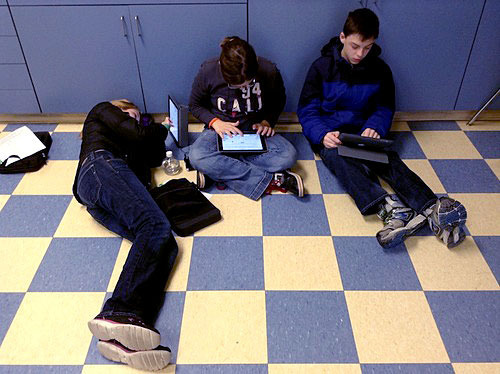
My student, Matthew Davis, told me what surprised him most, “I did get a chance to finish it. It was fun trying to achieve that goal. I met my estimated words goal. When you meet that goal or go above that, it feels amazing. When you keep on writing, it just flows.”
I think that my favorite thing in general about running the Young Writers Program was how excited my students were to write. As an ELA (English Language Arts) teacher, it is absolutely wonderful to have students come to class eagerly asking, “Are we going to write today?
Matthew explained, “It was one of those things you never thought you would be able to do. Finding the time to write… I had a bunch of time on my hands. Every day I would write one to two paragraphs. I started looking for more time to write because I was having so much fun with it. When you have to write something you don’t like, you try to avoid it, but I really liked my topic. It was really cool that you could write about anything.”
During NaNoWriMo, I worked all sorts of plot lessons into the curriculum, both of my own creation, and from the Young Writers Workbook. I loved being able to have students consistently refer to their own writing to make sense of concepts such as the elements of plot and character development.
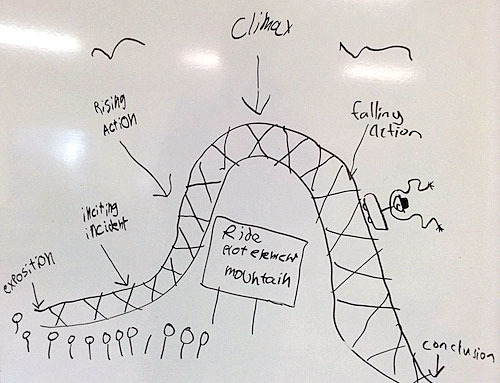
This year, with my 7th grade students participating for the second year in a row, I got to see such huge increases in both the quantity and quality of my student’s writing. In December, students used iPads to make book trailers of their own books. Some published their writing on Wattpad. We posted a list in the classroom of student books that were published online so that other students could read them during independent reading time. In a later unit in the spring, some of my students chose to turn their NaNoWriMo content into graphic novels. The Young Writers Program helped my students to really see themselves as actual writers, with stories to tell that could be read far and wide.
A few final words from Matthew: “I liked everything about NaNoWriMo. I really like how they just kind of opened it up. It gave me new writing techniques. It opened up different ideas for me. Now ideas come to me quicker. If I have to find a new topic, I feel like I can make a new beginning. I’m just glad I got the opportunity to do it, especially the second time around.”

Alexis Lyon teaches 6th and 7th grade English Language Arts at Lincoln Middle School in Portland, Maine. Her educational background includes degrees in Asian Studies and Ceramics. She has taught environmental education, low impact backpacking, and ceramic sculpture to students of all ages. When not teaching, you can likely find her in the waters and mountains of New England, surfing and snowboarding.
June 16, 2014
To a Future Writer: Competing Against My Past Self

We asked participants in our Young Writers Program to write a letter to their future selves about their hopes, dreams, and reminders of what they love about creating on the page. If you want to support the future of tomorrow’s stories, check out our YWP campaign here. Today, Katharine reminds her future self of their first stories:
Dear Katherine,
I don’t know where you are now, but I hope you’re still writing. You have so many stories inside your cluttered brain that I would genuinely be surprised if you stopped getting them out. The number of unfinished stories I’ve accumulated over this small amount of time is staggering enough, so I can only imagine the stacks of paper filled with the life of so many uncompleted plots.
The very first story I started writing that was longer than twenty pages was in fourth grade, and it was about a fantasy world filled with magic and dragons. That was my first real taste of story writing. Remember that? I worked on it up to fifth grade, when I realized that the writing was poor and changed too much over time. Sometimes I look back and read it. Do you?
I remember the first time I attempted NaNoWriMo, too. I had started what I thought was an excellent story, forming the plot, characters, and setting thoughtfully and carefully. By the end of NaNoWriMo, it was about 72,000 words long. The next year, I had over twice as much schoolwork to handle, but I decided that I couldn’t let my younger self beat out my older self. So, I strengthened my resolve and vowed to write at least 50,000 words to win NaNoWriMo, even with the increased workload. Wouldn’t you know it: I succeeded against all odds, with time to spare. I hope that you continue to push yourself in writing, despite the odds, and homework piled on by cruel and unusual teachers.
See, at least right now, I can’t stop writing. It’s like an addiction. One taste, and you can’t get enough of it. The creative process, the “aha!” moments… it’s too good to ever give up. Even when I have to put down my pencil for weeks on end due to a drought of inspiration, eventually, I get pulled back into the story again regardless of whether I like it or not.
By now, I hope that you’ve finally gotten something longer than a poem published, whether it’s a short story or a novel. If not, keep pushing and keep writing. After all, you never know what you can do until you’ve done it.
Sincerely,
Katherine, 6/16/14

Katherine has been reading since before she could walk and writing since not long after. She first attempted NaNoWriMo in eighth grade, also taking up the challenge in ninth grade. She won both times, the first by a hair’s breadth, and the second by six hours. Now going into tenth grade, she intends to continue participating in NaNoWriMo for as long as she can, looking forward to her graduation from the Young Writers Program to the regular NaNoWriMo with a mixture of apprehension and excitement. In the future, she hopes to be an editor and part-time author.
June 13, 2014
Stories of Tomorrow: How Writing a Book Can Be a Life-Changing Moment
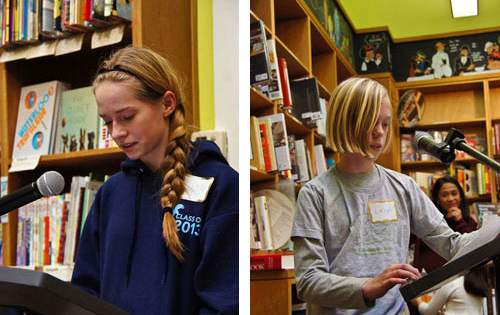
(Above: Participants in the Young Writers Program at a reading at a bookstore in Berkeley.)
Tomorrow’s stories start in all sorts of places: on the drive to work, or at the movie theater. One constant source of inspiration? The classrooms that tackle NaNoWriMo through our Young Writers Program. YWP educator Christina Brodersen tells us how writing and publishing a book can be a life-changing moment for her students:
I’d love to take full credit for initiating the Young Writers Program at Zurich International School (ZIS) but the reality is that in 2010, a year before I started, a small group of Grade 5 children had participated in YWP with another teacher.
I was thrilled when I realised that the school had not only tried YWP out but found it too valuable to drop again. Don’t get me wrong, it’s not like writing isn’t already supported at our school: they teach creative writing from kindergarten. But because it’s part of the school curriculum, writing is assigned within a pre-set structure and with a specific purpose, e.g. writing about a school trip in the past tense, or making sure you cover five activities.
With YWP, the students are allowed to write freely, telling their story without having to worry about anything but telling it well, their choice of subject, genre, story arc, and culmination. And we as mentors simply do what we can to guide, encourage and motivate them to see it through to the end.
The brilliance of YWP is the virtual classrooms. We inform everybody of what’s going on, put up motivational links to things like the pep talks, keep track of everybody’s progress, have the kids sign up as each other’s writing buddies (though they really need no prompting from us in that respect—some of them found that feature before we did!), and wage Word Wars with other groups of young writers.
It’s a lovely, flexible structure that creates a sense of community. And because we’re an international school with a substantial number of expats and families staying in Switzerland between 1 to 5 years, we can use the virtual classroom to stay in touch with students who left ZIS but still want to participate in NaNoWriMo if the school they go (back) to doesn’t run YWP.
We quite like the workbook, too. We always ask the kids to fill out the character sheets and story roller coaster in October and encourage them to look in the workbook during November if they need to remind themselves where they wanted to take the story or if they need inspiration for plot development or dialogue. We use other materials for teaching creative writing to the group too, but the workbook is usually the first thing we hand out.
What I like best about YWP and NaNoWriMo in general, though, is the focus on writing without editing, being creative without being critical and allowing yourself to go on an adventure with your characters without questioning if it’s “good enough.” At least for the first draft.
However, accepting the “you cannot delete anything” rule is just as big a challenge for them as it is to get enough words stuck together to meet their word-count goals because they’re so critical of themselves. So we tell them that if they write something in November that’s so offensive to their sensibilities that they can’t stand looking at it they can move it to the very bottom of the document but it stays in and it’s counted. Even if they think it’s the worst thing ever written, it stays. And more often than not, when they go back to something they thought stank worse than a skunk knee-deep in raw sewage it turns out to be not only tolerable but actually quite good. Sometimes great. And if they listened to their inner editors and deleted it, they would never have that experience.
They spend two months editing, revising and rewriting after November but it’s such a valuable experience for them to spend an entire month basically saying “yes, and” rather than “no, but.”
The first year I ran YWP at ZIS everybody had to set their word count goal before November 1st and it couldn’t be changed during November. That created a slight sense of panic (read: full-blown hysterical paranoia) because we had to get everything up and running, make sure every student had created an account and changed the word count goal from the default 50,000 to a more manageable one. Our participants are 9, 10 or 11 years old so just navigating successfully through the sign-up process is quite an achievement.
All through November we were nervously monitoring the students’ writing progress because we weren’t actually sure how a group of ten-year-olds would react to a month’s relentless writing. They all fought and wrote and won, and we celebrated with a cupcake party in the beginning of December.
It’s a great relief that the word-count goal is no longer locked, and I’m a much less anxious person during set-up in October. We have actually utilised this new feature to better motivate the writers who take off like a rocket and hit their word-count goal within ten days by having them increase their goal to still have something to challenge themselves with for the rest of the month. This is particularly useful when they later get stuck with their stories; rather than just having them lean back and saying “Well, I don’t have to write any more,” they still have to produce words every day to make it like everybody else. They all progress differently as writers, and being able to change the word-count goal supports taking a differentiated approach to their writing like every other aspect of their learning.
Other than that, I think the biggest obstacle was actually figuring out what to do after November. Now, we take them through a two month revising and editing process with mini-lessons once or twice a week to turn their November creation into an actual, readable story with a beginning, middle, and an end. And we equip them with a very detailed walk-through of how to use CreateSpace to publish and spend a full month formatting their stories, creating their covers and finally sending it off to be published. During this final month I will meet with the authors individually 1-3 times to help them with the problems they encounter. And that’s had an amazing impact; the past two years, every single student who started YWP in November has gone on to publish their books in February.
The imagination of the kids never ceases to amaze me. Every year I think I’ve heard it all but I quickly realise I haven’t when they start telling me about their stories involving secret agent ostriches or hamsters, Nobel Prize winning freedom fighters, the secret lives of shirts, or a school for cheesepuffs. Epic adventures with aliens, monsters, fairies, elves and… killer peacocks. Warm, deep and sometimes sad books about friendship. You name it, we’ve got it. And then some.
I’m insanely proud of each and every one of the students who have chosen to take the YWP challenge and I feel ridiculously privileged to have been allowed to go on this journey with them. Some fly and some crawl, some have to fight harder than others, some need to be pushed harder than others but they all reach the finishing line, not only in November but even more so when they stand on stage on Book Day at school, showing their brand new, printed paperback book to the world, the story they wrote.
The look of pride on their faces when they receive the NaNoWriMo certificates from the principal and read from their books to an audience of equally proud parents, teachers and admiring younger students is just amazing.
And sometimes I don’t even realise how much of an impact participating in this project has made in their lives until a parent visits the library and tells me how they’ve watched their child grow with the task, becoming more confident with each word written and emerging triumphantly on the other side an author. Having accomplished something that will stay with them forever. Something they with absolute certainty knew in November they couldn’t.
Those are the times I can’t help crying.
There are very few events in our lives that we, when we look back, recognise as pivotal and life-changing. Writing a story in a month and turning it into a published book will for some of these kids be such a moment.
I don’t think it gets much better that that.
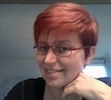
Christina Brodersen has a PhD in Computer Science and has worked as an Assistant Professor, an Innovation Consultant and a User Experience Researcher. But she happily traded all that in for the glamourous role of Library Assistant at Zürich International School. She spends her days helping students discover the magic of reading great stories. She’s originally from Denmark but has for the past 6 years been enjoying the mountains and chocolate (and mountains of chocolate!) of Switzerland with her two kids and husband. She loves to write but can’t bear to show it to anybody because her inner editor rules the creative kingdom of her mind with an iron fist. And a mallet. And possibly nuclear weapons.
June 11, 2014
To A Future Writer: The Religion of Writing
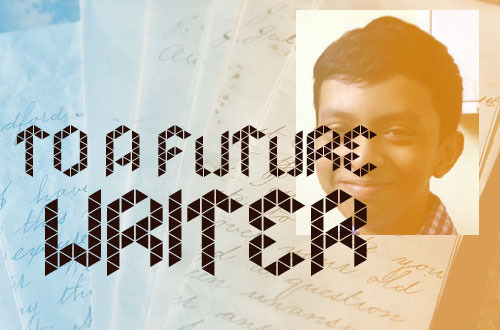
Inner editors are full of reasons not to write your story: so why add to the chorus? We asked participants in our Young Writers Program to write a letter to their future selves about their hopes, dreams, and reminders of what they love about creating on the page. (Want to write your own? Check out our #ToAFutureWriter campaign tomorrow, June 12!) Today, Aswin hopes his future self continues to revere writing:
Dear Future Aswin,
First of all, let me greet you by saying good morning/good afternoon/good evening depending on where you live. Oh, and I hope you’re enjoying your coffee or tea right beside you or I hope that you are having a good day.
So let me begin my story.
Right now, I am no special guy. But my main aim in life is to make a name for myself, which the majority of people on the Earth are going after.
But, let’s keep our future aside. Let’s get to the topic for now:
Writing, to me, gives me a feeling that I never get when doing anything else I like. I mean, there’s nothing like sitting down and writing something, be it a sentence to a novel, or this letter.
Most of us here at NaNoWriMo have a story to tell. God has sent us to Earth with a mission. A very, very special mission…
We are given the task of giving people something to read.
During our lifetime, we only get to enjoy life fully when we are kids. When we grow up and have responsibilities, our free time gets slimmer and slimmer. Eventually you might even become the President of America and you have 0% free time and you are over-loaded with work.
Not only do the people get happy by getting something to read, but we also get the pleasure of writing—like I have before: writing is a feeling you get once in a while. If you don’t write down that idea you get in that split second, it’s lost forever in a void of loneliness. Those lost ideas might become the next bestseller! Who knows!
Writing has also changed me in many ways.
Sometimes I get incredibly angry with my annoying little sister. Also, I get fed up with life sometimes. Trust me, we’ve all been there. Writing might cool you down a little bit, know what I’m saying?
I wish some genius could go ahead and make a new religion, a religion called “Writing”. Where words are kings or queens or letters are like gods… Anywho, we know that that genius would never come and the religion called “Writing” will never come true.
But who knows? Some random guy—maybe you, now?—might step up and announce it to the world that there is a new religion on the block. Until then, though, we must wait. Boohoo…
Oops, look at that clock! It is time for me to go.
Good day, future novelist,
Aswin, June 11, 2014

Aswin Ajith Kumar (EpicIndian) is a teenager from Southern India. He has written two books from NaNoWriMo, one from the Young Writers Program, one from Camp NaNoWriMo. He has published one in Amazon and one in the making. His dream job is to become a rocket scientist and a published author.
June 9, 2014
NaNoWriMo, Live!
Hey, what’re you doing in an hour? The NaNoWriMo staff is live-streaming at 4 PM PDT to talk about NaNoWriMo in 2014, the Young Writers Program, and how writers can change the world.
To A Future Writer: The Fantasy of the Perfect Writer
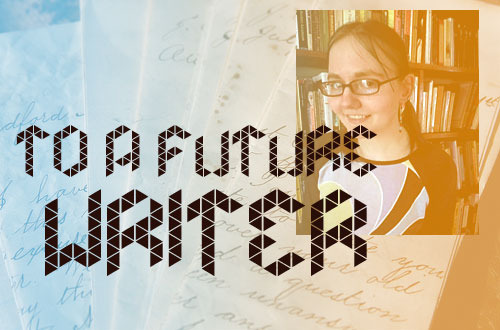
Inner editors are full of reasons not to write your story: so why add to the chorus? We asked participants in our Young Writers Program to write a letter to their future selves about their hopes, dreams, and reminders of what they love about creating on the page. (Want to write your own? Check out our #ToAFutureWriter campaign on June 12!) Today, Lou hopes Future Lou will learn to live easily with her own expectations:
Lou of the Future,
Last night, aware that the deadline for this letter was 48 hours away, and equally aware that it was a meaningful and flattering opportunity for a 19-year-old fledgling writer, I did what you’ve come to expect of me: I procrastinated. I locked the door to my family’s small, somewhat dingy bathroom with a book of steampunk short stories under my arm, and ran myself a bath with bubbles in it.
This is not a particularly new habit of mine. I’m hoping that time has changed my terrible habits of conflict-avoidance, but I’m sure that my future self will still remember how hard the first few months of 2014 have been. Despite having committed myself to the creative writing major a few short months before my December graduation from the local community college, I hadn’t done it. I hadn’t become her. Become, I so desperately hope, you: the person who is a real writer, and not a fraud.
And so instead of occupying her role in life, and spending my evening honing my craft, I played with bubbles and pretended to be Private Natalie of the Quiltbadger Airship.
I’m sorry. I should say that right now. No matter how good your camouflage is, no matter how proud I am of you for trying, you are never going to be that girl who wears a talented writer skin with ease. You’re going to pick at it when no one’s looking. You’re going to lock yourself away every so often, so you can pretend to be something more glamorous than herself.
And somewhere along the line, I’d like you to realize that that is what being a writer is.
These last few months, I’ve made some pretty stupid decisions and some pretty smart ones. I’ve spent days in a haze of anxiety, because I made the decision that no matter how out-of-place I feel, I’m going to college in the fall to study writing. Not to hold writing as a secret dream anymore, not to tell myself that someday, when I’m a picture-perfect pinnacle of a girl, I’ll become a writer. But to be a writer, no matter how messy and confusing it might be.
And so I’ve been scared. Scared that this person I want to be is never going to exist, and scared that I’m going to run amok through her designated path in life, making a mockery of everything I hoped you’d become. I’m scared that my decision to continue writing is not going to make this any easier, and that no matter how many times I assert myself as a real-life writer, I’m still going to act like an anxious kid with pathetically heartfelt dreams of doing something grown-up. And I’m scared that committing to writing won’t make me any better at it, and that even when I do improve, I’ll never reach those heights I dream of when I hide from the real world and just play pretend.
But then again. Even when I refused to even look at this letter, even when I stuffed my ears with bubble bath and blocked my thoughts with goggles and airships and Victorian dresses, a part of me drifted away from this safe haven I created. No matter what anxiety was there, no matter what fear, I couldn’t keep my head from drifting off the page to my own clockwork heroine.
I might not be living up to my own expectations, and you might not either. But I’m keeping the stories alive, and I’m making sure that you will, too. And for that, I should say that you’re welcome.
All my love,
Lou of the Past

Louise Kendrick, 19, is a socially awkward creature whose comfort zone consists of her dogs, fantasy, and, from 2008-2013, the Young Writers Program of NaNoWriMo. Her hobbies include knitting, playing flute, and daydreaming about a point in her future where her life is perfectly together and she has a troupe of rabbits named after her favorite fictional characters. You may know her by her online username, Ser thayanora, because she has never quite given up on her dream of becoming a knight.
June 7, 2014
How Your Writing Can Change Worlds
You are a world-changer. Now, maybe you just crinkled your nose at that, or rolled your eyes a little, something twinging at such a pronouncement.
But here’s the thing: it’s true. With every novel you write, you create a brand new world, with new lives, and then commence changing it: knocking something off-kilter here, nudging two people together there. You, very literally, change worlds in your writing.
And you don’t stop there. The amazing thing about the NaNoWriMo community is that you rally around your fellow writers, and around the cause of writing. Many of you become Municipal Liaisons, working with your local libraries, bookstores, and small businesses to create a more creatively engaged community. All of you become story advocates, encouraging your friends, family, and heck, even your barista, to share their stories.
You’re doing important work:
According to a count conducted by the Cooperative Children’s Book Center, only 7.9% of the books published for children and teens in 2013 were written by people of color.
The VIDA Count, which catalogs female representation in major literary journals and book reviews, found that only 33% of contributors and featured authors in the biggest literary journals were women.
Encouraging the voices of everyone in our lives has to start early. Many of us remember first being told that our stories were not worth telling in grade school. It’s why we launched our Young Writers Program in 2005. Our amazing educators encourage their students to freely express themselves and validate their voices, giving them room to discover the stories that matter to them on the page.
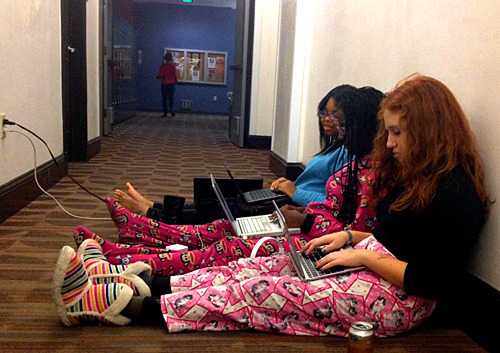
Okay, we’re going to throw some more numbers at you (this time they’re more encouraging!): in a study conducted by Public Profit, 81% of our YWP participants said that NaNoWriMo helped them expect more from themselves in the future. For students who attend schools where more than 75% of students receive a free or reduced-price lunch, 83% said NaNoWriMo helped them learn what they can accomplish when they are determined.
You are a world-changer. And we need your help to change this world: to make it a more creative, and celebratory of stories of all kinds. We’re launching our Stories of Tomorrow Campaign to raise money to rebuild our Young Writers Program site to better support the 100,000 educators and students who are learning, some for the first time, that their stories can matter.
We need your help to continue this good work. Find out how to support the Stories of Tomorrow campaign here. Donate today.
June 6, 2014
Stories of Tomorrow: The Stuff Writing Miracles Are Made Of
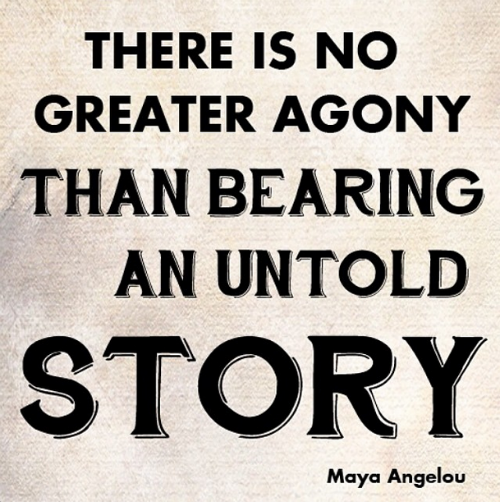
Tomorrow’s stories start in all sorts of places: on the drive to work, or at the movie theater. One constant source of inspiration? The classrooms that tackle NaNoWriMo through our Young Writers Program. YWP educator Kim Sutherland shares the three most surprising things she discovered while guiding her students through writing a novel:
I had heard about NaNoWriMo as a teacher consultant with the National Writing Project, and was interested in participating personally. In fall of 2011, I was browsing the NaNoWriMo website to get more details, and came across the link to the Young Writers Program. That year, I was teaching a group of particularly reluctant readers and writers in my fourth and fifth grade self-contained class at the alternative day school in which I work. My writers’ workshop time with them was not as fruitful as had been in past years. It just wasn’t their cup of tea, and I was struggling to find alternate ways to motivate my young students.
The YWP site had so many resources, ideas, and stories from teachers who had successfully run the program across many different settings, I thought, “Why not?” I figured my students would appreciate the authentic, real-world application of writing like a professional, and we could make the experience even richer by writing together.
There were a couple of difficulties in running the YWP that first year. No other teacher at my school had ever tried writing a novel, either personally, or with their students. So I was dependent on the YWP website for support. Additionally, it was a tight timeline. We decided to take on this endeavor in late September, and didn’t fully begin to prepare until the second week in October. What made it bearable was that my students were wildly enthusiastic about writing a novel, and that made my crash course in learning the ins and outs of NaNoWriMo and the YWP more than bearable! There were so many surprises as we went along.
The first is how easy it was for buy-in on the part of the kids. They were really jazzed at the thought of doing the work of real writers, and I pushed that concept from beginning to end. It helped keep us all focused and motivated to reach our goal.
The second was the two paraprofessionals in my class agreed to write along with us, although they were somewhat reluctant to do so. The three of us writing together with our students brought a new dynamic to the class, where our discussions about our writing weren’t teacher to student, they were writer to writer.
Lastly, in a school setting where on-task behaviors typically max out at 20 minutes, I was amazed to see the endurance with which my students worked on their novels. I had allocated an hour a day for writing, but there were students who asked to write through part of their recess and lunch periods, because they were so motivated to continue with a plot line or character description. Difficult behaviors decreased during NaNoWriMo, and more positive and pro-social behaviors emerged. The support the kids accepted and gave was inspiring.
My favorite NaNoWriMo moment happened on a day when I wasn’t feeling particularly wordy, and was sitting at my computer station, lollygagging while the students around me were typing feverishly.
One of my fourth graders leaned over, looked at my screen and said, “You haven’t typed a word in over five minutes”.
I sighed and admitted that I was in a rut.
She patted me on the back and whispered into my ear “You know you can do this. Some days are better than others. Just write. It doesn’t matter if it’s good or not. That’s what revision is for”.
That’s when I knew that NaNoWriMo was the stuff writing miracles are made of!
In the future, I would love to see all the adults who participate with the kids commit to writing with them each day, and have training for teachers to practice the characteristics of good, authentic, real-life writing, and to focus on a “writerly” life. That’s a hard sell for adults like me who are so tempted to edit and revise as we write instead of just get the ideas down on paper!
Writers don’t need much, but it does make a difference to the kids when their work is honored by providing them with the tools they need and the ones that help them maintain the excitement and drive to get to that promise land—their word count!
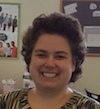
Kim Sutherland is an elementary special needs teacher in the Fall River (MA) Public Schools. She’s a teacher-consultant with the Buzzards Bay Writing Project—a local site of the National Writing Project—and is director of their Invitational Summer Institute for teachers. She lives in Rhode Island with her family and is currently revising her first NaNoWriMo novel, to the dismay of the main characters in her second and third NaNo-novels.
Chris Baty's Blog
- Chris Baty's profile
- 63 followers




